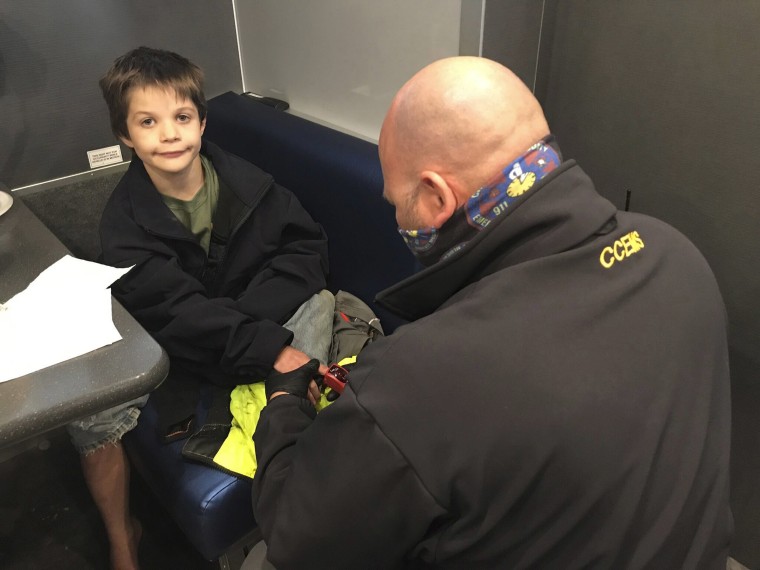At 7:28 p.m. Sunday, the Tennessee Bureau of Investigation issued an Endangered Child Alert with a description of a 9-year-old boy whose parents had reported him missing that day.
The boy, Jordan Gorman, was last seen in a wooded area near his home in Ashland City, roughly 20 miles from Nashville, the agency said.
Less than 24 hours later, the bureau issued a statewide Amber Alert citing "new information and growing concern" about his well-being. By Tuesday afternoon, after local, federal and state investigators had searched for him, he was found safe at a creek bed about three-quarters of a mile from his home. The boy told investigators he found a blue tarp and built a shelter, where rescuers found him.

It was an outcome that the family of 15-year-old Quawan "Bobby" Charles, had hoped for in October. Instead, Quawan was found dead in a sugar cane field, more than 20 miles from his home in Baldwin, Louisiana, days after being reported missing. Authorities are investigating his death as a homicide.
An Amber Alert was not issued for Quawan, because Baldwin police said his disappearance did not meet the criteria.
The teen's family and their attorneys have said the local police were slow to act and have questioned whether his death could have been prevented had officers immediately sounded the alarm about his disappearance.
The drastically different outcomes in Quawan's case and that of Jordan's in Tennessee have led attorneys for the former's family to question whether there are cracks in Louisiana's Amber Alert system.
The Louisiana State Police, which activates Amber Alerts in the state, said it wasn't contacted about Quawan's disappearance and the agency wasn't part of the initial investigation.
"LSP follows strict guidelines when considering an Amber Alert to ensure the effectiveness of the message and the attention of the public," Lt. Nick Manale, a spokesman for the agency, said. "It will be used only for serious child abduction cases, and it will not be used for runaway or most parental abduction cases unless the circumstance is proven to be life-threatening to the child."
Chase Trichell, a lawyer in Baton Rouge, who is representing Quawan's family, said that criteria is problematic.
"If the parent doesn't know where he is, they can't intelligently confirm whether he has been abducted or killed," Trichell said. "The presupposition that someone has to be snatched from his house in order for this to be taken seriously or go to the media, that's ridiculous."
The Louisiana State Police has not issued any Amber Alerts this year. It has issued a secondary alert, the Level II Endangered/Missing Children Media Advisory, nine times in 2020.
"Their frustration with law enforcement in this case is the inevitable outcome of the way we have oversold Amber Alert effectiveness," said Timothy Griffin, a professor of criminology at the University of Nevada, Reno. "It’s not intentionally deceptive. It’s simply emerged as a byproduct of law enforcement's desire to show that they're trying."
Griffin said he has looked at more than 2,000 media reports of Amber Alert cases in the past 15 years.
"The fundamental problem from an Amber Alert policy perspective is that we have these ridiculous expectations of the system," he said. He refers to this as "crime control theater."
The problem isn't the Amber Alert, he said, but how people think about it.

"We think it’s some kind of silver bullet — if you issue an Amber Alert, you get the kid back safe. No, wrong, that is not how it works," he said. "The only kids who come back from Amber Alerts are kids that are going to make it anyway because they’re not in any real danger."
This is something that the people who run it and implement it and the public don’t understand, he said. "In a situation where a kid is going to die, there’s nothing we can do," he said.
Griffin said he does not believe the Amber Alert system needs to be abolished.
"What it needs is a more honest discourse," he said. "The people who run it, the people who implement it mean well. These people are well intended."
The Iberia Parish Coroner's Office said in a preliminary autopsy report that drowning appears to be the most likely cause of death of Quawan. A toxicology report has not yet been released.
But Trichell said none of the bodies of water near the sugar cane field where the teen was found were deeper than 2 feet.
His family filed a missing persons report Oct. 30 in the St. Mary Parish town of Baldwin. Quawan's mother had planned to take him to get a haircut that afternoon, according to another attorney for the family, Ronald Haley Jr. After she couldn't reach him for hours, his father forced down his locked bedroom door, but Quawan was gone, Haley said. So his father called the Baldwin Police Department, Haley said.
Baldwin police told his parents he might be at a football game or at Boo by the Bayou, a Halloween event in the town, Assistant Chief Samuel Wise said. Wise said officers had searched for Quawan in Baldwin each day he was missing. His body was found the evening of Nov. 3 in the Iberia Parish town of Loreauville.
The Iberia Parish Sheriff's Office said it was not notified of the potential that there was a missing person in the area until Nov. 3 when it was contacted by one of Quawan's parents.
But the response to Jordan's disappearance was different.
Tennessee also reserves Amber Alerts for "the most serious of missing children cases, in which law enforcement believes that a child is in imminent danger," according to its bureau of investigation's website. The agency has issued nine Amber Alerts in 2020.
The boy's foster parents said he ran away after a disagreement, NBC affiliate WSMV of Nashville reported. The foster parents, Mark and Coletta Gorman, could not be reached for comment. They had reported him missing to the Cheatham County Sheriff's Office. A spokesman for the Tennessee Bureau of Investigation, Josh DeVine, said Wednesday that the agency was working to determine specifics of the circumstances surrounding Jordan's disappearance "and have nothing further to add at this time."
Authorities had said they believed the boy was barefoot in a rugged, wooded area.
"Think about anywhere that a 9-year-old boy might be able to seek shelter," DeVine said at a news conference Monday, adding that temperatures were below freezing in the area Sunday night and it was expected to be just as cold Monday night. "So we have an imminent concern for this child's well-being."
The bureau initially sent out an Endangered Child Alert and then raised it to an Amber Alert, which notifies several organizations and agencies. Jordan was found by a rescue team from Kentucky, the Christian County Rescue Team, a day after the Amber Alert was issued.
Download the NBC News app for breaking news and politics
James Alan Fox, a criminologist with Northeastern University in Boston, said there are situations in which Amber Alerts are launched inappropriately and that if one was issued every time a parent wanted one to be, they could become less effective.
"If we have a lot of cases where they're launched inappropriately, people will start tuning them out," he said.
Fox said deciding whether to activate an Amber Alert isn't easy.
"It’s sometimes a difficult call. You could do it too quickly and be wrong and there could be negative consequences of that," such as misused resources or innocent individuals being suspected of wrongdoing.
"You can either do it when you shouldn’t or not do it when you should," he said. "There’s no perfect science to know when it’s right. It’s always a judgment call."
